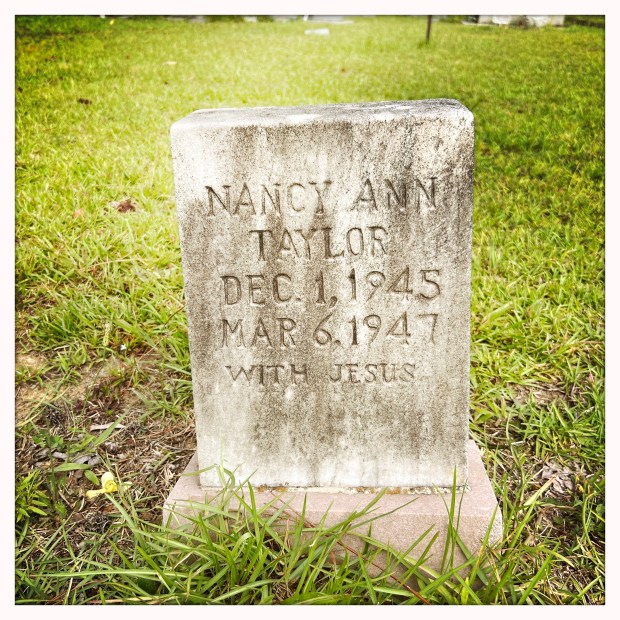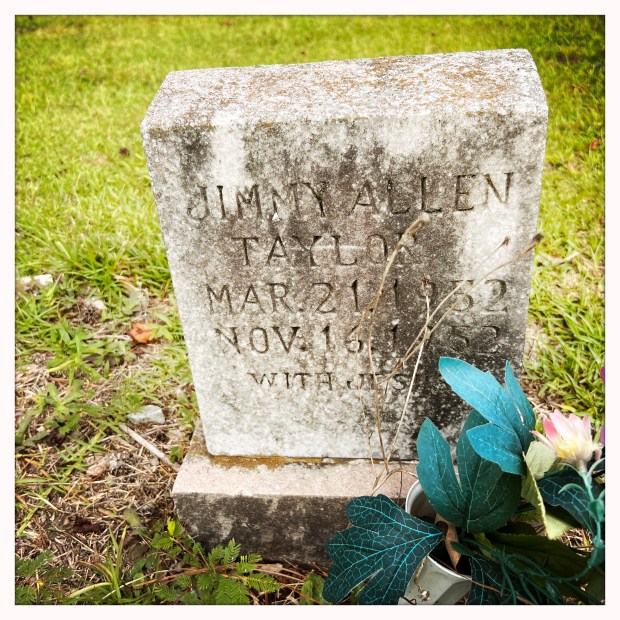Our discovery of the remains of Barnes Primitive Baptist Church began with a search for a slave cemetery and a school believed to be in the same vicinity. I’m fairly certain Barnes School actually was once near by, but L. Paul Sherrod Jr. said he had heard conflicting information about the cemetery, and we saw nothing that suggested a graveyard. This burial ground would have been associated with the plantation of Dr. Edwin Barnes, whose family cemetery I featured in a post Friday.
Today, a chance find that confirmed we’re on the right track:
Wilson Daily Times, 23 April 1955.
David Ruffin‘s funeral was conducted at Barnes Primitive Baptist, and he was buried “in the Barnes cemetery near the church.” So there is, or was, a Barnes cemetery near Barnes Church. But where?
Here is Barnes Church in a 1940 aerial photograph. The light gray area below and southeast of the church, showing few trees, is worth exploring in a search for the cemetery.
——
In the 1900 census of Stantonsburg township, Wilson County: farmer Isaac Ruffin, 52; wife Chania, 55; and sons Isaac, 22, Dave, 17, Grey, 7, and William, 5.
On 31 December 1903, David Ruffin, 21, married Celie Barnes, 19, in Stantonsburg township, Wilson County.
In the 1910 census of Stantonsburg township, Wilson County: farm laborer David Ruffin, 24; wife Celia, 18; and children Clara, 7, and Daisy, 2.
In 1918, Dave Ruffin registered for the World War I draft in Wilson County. Per his registration card, he was born 6 January 1870; his nearest relative was Celia Ruffin; and he farmed for E.B. Graves.
In the 1920 census of Stantonsburg township, Wilson County: tenant farmer David Ruffin, 41; wife Cellie, 33; and children Daisy, 22, Dessie, 10, David Jr., 6, and Lula, 4.
Larsey Ruffin died 6 August 1926 in Wilson township, Wilson County. Per her death certificate, she was 18 years old; was born in Wilson County to David Ruffin and Celie Barnes; and worked as a tenant farmer.
In the 1930 census of Stantonsburg township, Wilson County: farmer Dave Ruffin, 50; wife Celia, 45; daughters Clara, 28, Daisy, 19, and Lola M., 16; son-in-law John Hales, 39; grandchildren John, 10, Dave, 7, and Maizie Hales, 5; and son Dave, 19.
In the 1940 census of Stantonsburg township, Wilson County: farmer Dave Ruffin, 50; wife Celia, 45; and [grandchildren] children David, 17, and Mazie, 15.
In the 1950 census of Stantonsburg township, Wilson County: Dave Ruffin, 78; wife Celia, 67; sons [sic] Walter Lee, 16, and George, 12; and sister Anna Artis, 77.
David Ruffin died 20 April 1955 at Route 3, Wilson. Per his death certificate, he was born 2 August 1893 in Wilson County to Isaah Ruffin and an unknown mother; was married; was engaged in farming; and was buried in Barnes Cemetery. Carrie Hayes, 202 Pettigrew Street, was informant.
Ten days later: Celia Ruffin died 30 April 1955 at 202 Pettigrew Street, Wilson. Per her death certificate, she was 61 years old; was born in Wilson County to Calvin Barnes and an unknown mother; was a widow; was engaged in farming; and was buried in Barnes Cemetery. Carrie Hayes, 202 Pettigrew Street, was informant.


























